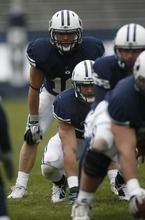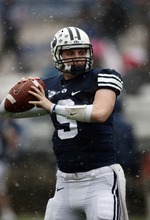This is an archived article that was published on sltrib.com in 2011, and information in the article may be outdated. It is provided only for personal research purposes and may not be reprinted.
Provo • When Brigham Young University declared its football independence in September, athletic director Tom Holmoe warned BYU fans and followers that for the next few years, the postseason picture would not be pretty.
The former Cougar and San Francisco 49ers defensive back said the move was being made primarily for better television exposure first, increased revenue and everything else a distant second. Postseason play, though important, was just one of those kinks that needed to be worked out, a "growing pain" as the Cougars left the relative security of the Mountain West Conference, and its contracts with bowls in Las Vegas, San Diego, Fort Worth/Dallas, Albuquerque and Shreveport, La.
With the announcement last month that BYU will play in the Armed Forces Bowl in Dallas on Dec. 30 this year if it is bowl eligible (six wins) and not selected by a Bowl Championship Series (BCS) bowl, the school's postseason future for the next three years is fairly clear. In December, BYU accepted invitations to play in the 2012 Poinsettia Bowl in San Diego and in the 2013 Kraft Fight Hunger Bowl in San Francisco.
Consensus among BYU fans seems to indicate that the bowl situation hammered out in the past six months by Holmoe is palatable, if not ideal.
"I am pleased in our ability to secure a bowl arrangement for the upcoming season and that [we] now have bowl agreements in place for the next three years," BYU football coach Bronco Mendenhall said Monday. "Each bowl provides our team and fans the opportunity to go to a great destination city for postseason play."
Also answered — again, it appears — last month was the question regarding BYU's access to the BCS, although it did not come as a surprise, and it was not the news the Cougars wanted to hear, either.
Bill Hancock, executive director of the BCS, confirmed to The Salt Lake Tribune last week that for now, the BCS board (commissioners of the 11 NCAA Football Bowl Subdivision conferences, and the Notre Dame athletic director) has determined that BYU will have the same ability to earn a bid to a BCS bowl as the other two independents not named Notre Dame — Army and Navy.
"How to handle BYU's decision to become an independent actually came up last fall [after BYU's announcement]," Hancock said. "The [board] agreed that all independents besides Notre Dame would be treated the same."
That means BYU (along with Army and Navy) now has the worst BCS access in the country. The Cougars are eligible to be picked by a BCS bowl if they finish in the top 14 of the BCS standings, but are guaranteed a spot only if they finish in the top two, which would qualify them to play in the BCS National Championship Game.
"Right now, the BCS is not the reason we made this move [to independence]," Holmoe said last fall.
Good thing, because if the Cougars were hoping for Notre Dame-like access, or something between the guarantee that the Irish have (Notre Dame is assured a spot in a BCS game if it has nine wins and finishes in the top eight) and what Army and Navy have, it doesn't appear they are going to get it anytime soon.
Hancock said the topic came up "in passing" at the BCS meetings in late April in New Orleans, but was not a formal agenda item. He doesn't sense any "appetite" among commissioners to grant BYU access similar to what Notre Dame receives, while acknowledging that BYU has actually had a better record than Notre Dame in four of the past five seasons.
"I don't want to say it didn't come up at all," Hancock said. "It just came up in the context of, 'OK, next year there will be three non-Notre Dame independents, and each will receive the same access.'"
Holmoe declined to be interviewed on the matter by The Tribune last week, saying he will discuss BYU's postseason situation and other topics in a sit-down session with reporters later this week. However, a week before the BCS meetings in New Orleans he told The Sporting News he did not expect BYU's BCS-access status to change this year, but hopes that down the road BCS officials will give the Cougars better access.
"We're not saying we should be like Notre Dame," Holmoe told TSN. "They came in with an established record. We're trying to take small steps."
Hancock said he has had "several" conversations with Holmoe about BYU's access the past few months, but wouldn't describe the talks as lobbying by BYU. He said he has never talked with Army or Navy athletic directors about those schools' access to the BCS.
"I have quite a deal of respect for BYU, for Tom [Holmoe] and everybody I know at BYU," Hancock said. "It is important not to lose sight of that fact. But I think most people would agree … that Notre Dame's tradition and place in college football are special."
Hancock said he doesn't expect there to be a backlash against BYU from the BCS board because Sen. Orrin Hatch (R-Utah) and Utah's attorney general, Mark Shurtleff, are leading the charge to get the Justice Department to investigate whether the BCS breaches federal antitrust regulations.
"No, I don't. No way," Hancock said. "There is a great deal of respect for BYU among the commissioners [of the automatic qualifying conferences] and me."
Apparently, though, not enough to make BYU's future postseason picture look brighter than it does now.
drew@sltrib.comTwitter: @drewjay —
BYU's postseason future
2011 • Bell Helicopter Armed Forces Bowl in Dallas on Dec. 30
2012 • San Diego County Credit Union Poinsettia Bowl in San Diego
2013 • Kraft Fight Hunger Bowl in San Francisco BYU's BCS criteria
Like all Division I teams, BYU is eligible to be picked by a BCS bowl if it finishes in the top 14 of the BCS standings. But it is guaranteed a BCS spot only if it finishes 1 or 2, and that would be in the National Championship Game.
Note: Teams must have six wins to become bowl-eligible







